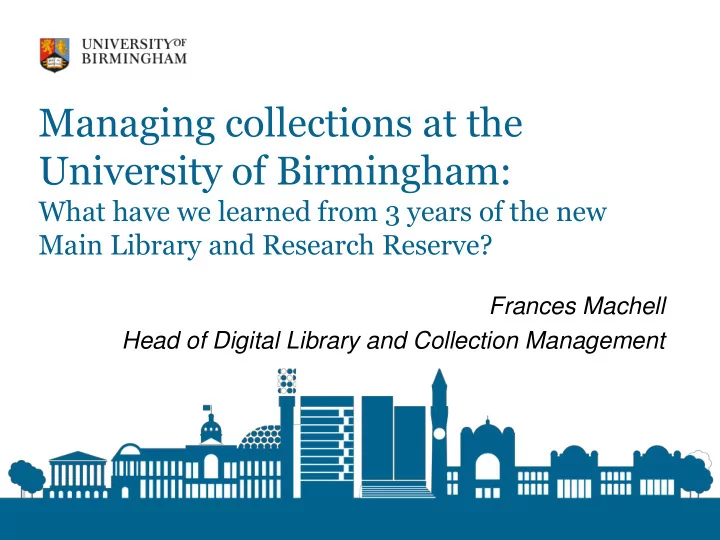

Managing collections at the University of Birmingham: What have we learned from 3 years of the new Main Library and Research Reserve? Frances Machell Head of Digital Library and Collection Management
The new Main Library
3 years in… what have we learned?
Main Library upper floors: 20% (12km) Higher use collections, open for browsing Books: loaned in last 5 years, purchased in last 2 years Journals: current, print only subscriptions Research Reserve: 80% (50km) Lower use collections, fetching service
Library E.g. books moved Use Only from RR to open shelves if: • On a resource Movement list (not based on: background Open • Resource reading), or list category shelves • 5 or more • Usage holds in a • Purchase rolling 12 date month period • Current Research editions only Reserve
Lessons learned Can’t escape manual overrides (for multi-volume sets, old editions etc) Metadata is a constant challenge No matter how you hone the reports, the data will find ways to surprise you (50k relegation items in 2019!)
The Research Reserve
Space in the Research Reserve Key layout decision: aim for a single Library of Congress book sequence Big benefits for fetching and browsing but – Interfiling and shifting will never end – Reduces working capacity of shelves – So many bookends…
Research Reserve requests Average 1639 physical item requests per month (Sept 16-Apr 19) Average 53 scanning requests per month – Scanning is free but only 3% of requests Most requests (>80%) are for monographs
Research Reserve requests LoC Classmark % of requests % of collection B (Philosophy, Psychology, Religion) 8% 6% D (History) 13% 14% H (Social Sciences) 13% 16% P (Language and Literature) 28% 24% Q (Science) 11% 6% Other 27% 33%
% of requests since 2016 where the classmark can be analysed:
Research Reserve requests Requests since Top ten most used sub-classes of LoC 2016* PR English Literature 2757 PN Literature (General) 1559 DA History (Great Britain) 1235 HD Industry/Management 1220 ML Literature on Music 1069 PQ French/Italian/Spanish Literature 1024 PA Greek and Latin Language and Literature 999 N Visual Arts 837 D History (General) 833 PS American Literature 811 *out of 37578 requests with extractable classmarks
Research Reserve requests In 18/19 – 54% of requests from undergraduates – 13% from post-graduate taught – 15% from post-graduate research – 12% from academic staff
Research Reserve browsing Politically important Only offered to academics, post-graduate research students, and taught students at their tutor’s requests Health and safety induction required ahead of/during first visit
Research Reserve browsing Average 33 visits per month In 2018, 374 visits, from 106 individuals – 27 individuals visited 5 or more times – The highest user visited 23 times Top 5 departments for browsing: – History; Classics, Ancient History and Archaeology; Music; Modern Languages; Byzantine, Ottoman and Greek Studies
Lessons learned Most usage comes from a concentrated group of users/subjects But there’s a big ‘long tail’ Users of the RR want books, not scans Comparatively low use from research students and academics compared to taught students
What’s next? Service development How low use should ‘low use’ be? – Strategic driver to raise profile of how Library Services support research – Service review group set up (processes, communication) – Summer intern focus on deeper understanding of researchers
What’s next? Space management Continued consolidation and interfiling Tough questions about best use of space Understanding the collection better through categorisation
Thank you f.e.machell@bham.ac.uk
Recommend
More recommend